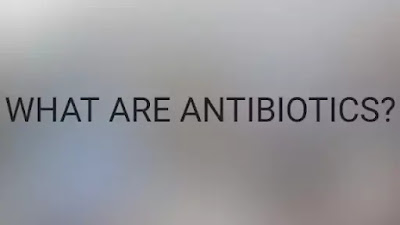What are Antibiotics?
Anti-toxins are medications that are utilized to treat as well as forestall bacterial diseases. They hinder the development and once in a while annihilate the microorganisms that cause diseases.
Anti-infection agent's use is supported on the grounds that it is genuinely innocuous to individuals and creatures. It treats illnesses brought about by microorganisms by restraining the blend of their phone dividers and once in a while by meddling in the working of their DNA.
Anti-microbials Definition
Anti-microbials can be characterized as a kind of antimicrobial medication that is utilized for the treatment and anticipation of bacterial contaminations by hindering the development of the microorganisms. They are not compelling when utilized for infections brought about by infections, for instance, cold or influenza. Infections are irresistible specialists which live in the cells of a host that can't get by all alone. It needs a host to deliver its protein for it. So by utilizing this, we can't fix viral illnesses and it might influence people by slowing down their cells.
History of Antibiotics
Initially, anti-microbial was gotten normally from microorganisms. Afterward, after the headway in manufactured techniques, the engineered anti-toxin was additionally evolved. In the nineteenth 100 years, Paul Ehrlich, a German bacteriologist began searching for a compound that can kill the microbes in people or creatures' bodies but doesn't antagonistically influence the strength of people or creatures. After different investigations, he found the medication arsphenamine, otherwise called salvarsan. It was utilized to treat the sickness called syphilis which is brought about by the microorganisms spirochete. He got Nobel Prize for medication in 1908 for his work on Immunity. Despite the fact that salvarsan was affecting people, the effect of medication on the microorganisms was significantly more than that on people.
In 1932, one more medication called prontosil was found by a group of Researchers at Bayer Laboratories which was like the compound salvarsan which changes over into sulphanilamide when it is taken into the body.
In any case, the genuine change in antibacterial treatment occurred with the revelation made by Alexander Fleming in 1929, of the normal anti-infection penicillin.
Who Discovered Antibiotics?
With the revelation of the normal anti-microbial penicillin, Alexander Fleming is credited with the disclosure of anti-microbials.
How do Antibiotics function?
Despite the fact that there are a lot of various sorts of anti-infection agents, they work in essentially two ways.
• Certain anti-toxins dispose of the microscopic organisms by killing them, similar to penicillin. They by and large disturb the arrangement of the cell divider or cell items in the microbes.
• The other sort of microbes hinders the duplicating activity of the microorganisms.
Kinds of Antibiotics
Anti-infection agents are essentially characterized in light of their synthetic design. Anti-infection agents with a similar primary class will exhibit comparable properties of viability, poisonousness, and sensitivity potential. They are:
• Penicillins
• Cephalosporin
• Macrolides
• Fluoroquinolones
• Sulfonamides
• Antibiotic medications
• Aminoglycosides
In light of how they work on halting the disease of the microscopic organisms, they can again be named:
• Bactericidal
They kill the microorganisms present in the body which causes infection.
For e.g.:- Penicillin and polymyxin.
• Bacteriostatic
The drugs which are utilized to repress the development of microorganisms are known as bacteriostatic.
For e.g.:- Tetracycline, Chloramphenicol.
Based on the scope of activity of anti-infection agents, they are partitioned as:
• Wide range
It tends to be named drugs that obliterate or hinder the development of a wide scope of gram-positive and gram-negative microbes.
For e.g.:- Amoxicillin
• Tight range
These kinds of drugs for the most part assault Gram-positive microorganisms or gram-negative microbes.
For e.g.:- Penicillin G
• Restricted range
It is compelling against a particular sort of living being or sickness.
Symptoms of Antibiotics
Anti-toxins are for the most part cross-really looked at a few times prior to allowing it for any clinical use. Yet, there are some of them which affect its utilization. Incidental effects rely upon the kind of anti-microbial utilized, the microorganisms which are designated and it likewise fluctuates from one individual to another. By and large, aftereffects are not that genuine for certain broad incidental effects being sickness, delicate stools (excrement), and loose bowels.
A few results of anti-microbials are:
• Anorexia
• Expanded Appetite
• EKG changes
• Epistaxis (Nosebleed)
• Gout
• Hepatotoxicity
• Hiccups
• Hyperkalemia
• Joint Pain (Arthralgia)
• Kidney Stones (Nephrolithiasis)
• Drive, Decreased
• Drive, Increased
• Myalgia (Muscle Pain)
• Nasal Congestion
Every now and again Asked Questions - FAQs
What are anti-infection agents' basic definitions?
Anti-toxins are anti-toxins that are utilized to treat bacterial diseases in people and creatures. They work by either killing microbes or making it challenging for them to develop and duplicate.
For what reason are anti-microbials utilized?
Anti-microbials are drugs that are utilized to treat or forestall bacterial contaminations. They don't neutralize viral diseases like the normal cold or this season's virus. Anti-toxins ought to simply be utilized to treat minor medical problems that are probably not going to determine without the utilization of anti-infection agents, like skin inflammation.
What befalls your body when you take anti-toxins?
Anti-microbials can have an assortment of negative aftereffects. Anti-infection agents are known to cause sickness, loose bowels, and hypersensitive reactions. Anti-microbials can likewise eliminate normally existing microorganisms that shield the body from yeast contaminations, in this manner yeast diseases can occur on them.
Are anti-toxins hurtful?
Anti-toxins are incredibly helpful in the battle against infection, however, they can likewise be perilous sometimes. Anti-toxins can cause unfavorably susceptible reactions as well as intense, maybe hazardous the runs brought about by the bug Clostridium difficile.
